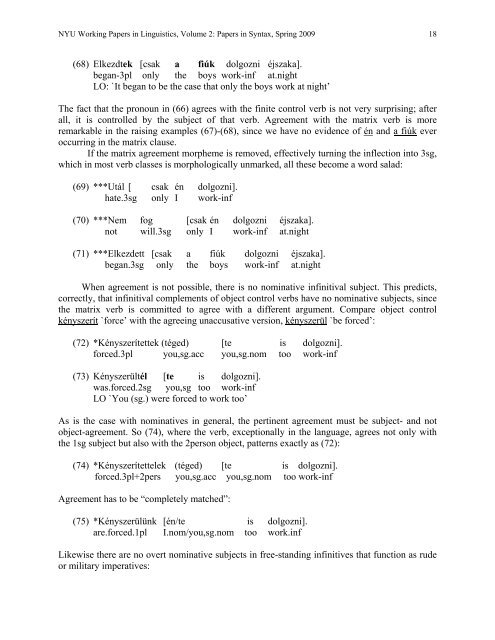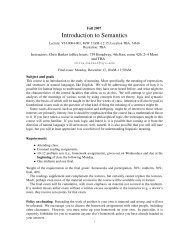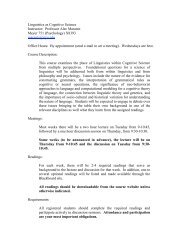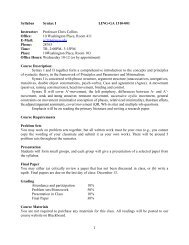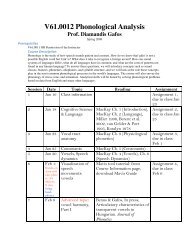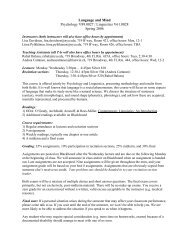Overt Nominative Subjects in Infinitival Complements Cross - NYU ...
Overt Nominative Subjects in Infinitival Complements Cross - NYU ...
Overt Nominative Subjects in Infinitival Complements Cross - NYU ...
Create successful ePaper yourself
Turn your PDF publications into a flip-book with our unique Google optimized e-Paper software.
<strong>NYU</strong> Work<strong>in</strong>g Papers <strong>in</strong> L<strong>in</strong>guistics, Volume 2: Papers <strong>in</strong> Syntax, Spr<strong>in</strong>g 2009 18(68) Elkezdtek [csak a fiúk dolgozni éjszaka].began-3pl only the boys work-<strong>in</strong>f at.nightLO: `It began to be the case that only the boys work at night’The fact that the pronoun <strong>in</strong> (66) agrees with the f<strong>in</strong>ite control verb is not very surpris<strong>in</strong>g; afterall, it is controlled by the subject of that verb. Agreement with the matrix verb is moreremarkable <strong>in</strong> the rais<strong>in</strong>g examples (67)-(68), s<strong>in</strong>ce we have no evidence of én and a fiúk everoccurr<strong>in</strong>g <strong>in</strong> the matrix clause.If the matrix agreement morpheme is removed, effectively turn<strong>in</strong>g the <strong>in</strong>flection <strong>in</strong>to 3sg,which <strong>in</strong> most verb classes is morphologically unmarked, all these become a word salad:(69) ***Utál [ csak én dolgozni].hate.3sg only I work-<strong>in</strong>f(70) ***Nem fog [csak én dolgozni éjszaka].not will.3sg only I work-<strong>in</strong>f at.night(71) ***Elkezdett [csak a fiúk dolgozni éjszaka].began.3sg only the boys work-<strong>in</strong>f at.nightWhen agreement is not possible, there is no nom<strong>in</strong>ative <strong>in</strong>f<strong>in</strong>itival subject. This predicts,correctly, that <strong>in</strong>f<strong>in</strong>itival complements of object control verbs have no nom<strong>in</strong>ative subjects, s<strong>in</strong>cethe matrix verb is committed to agree with a different argument. Compare object controlkényszerít `force’ with the agree<strong>in</strong>g unaccusative version, kényszerül `be forced’:(72) *Kényszerítettek (téged) [te is dolgozni].forced.3pl you,sg.acc you,sg.nom too work-<strong>in</strong>f(73) Kényszerültél [te is dolgozni].was.forced.2sg you,sg too work-<strong>in</strong>fLO `You (sg.) were forced to work too’As is the case with nom<strong>in</strong>atives <strong>in</strong> general, the pert<strong>in</strong>ent agreement must be subject- and notobject-agreement. So (74), where the verb, exceptionally <strong>in</strong> the language, agrees not only withthe 1sg subject but also with the 2person object, patterns exactly as (72):(74) *Kényszerítettelek (téged) [te is dolgozni].forced.3pl+2pers you,sg.acc you,sg.nom too work-<strong>in</strong>fAgreement has to be “completely matched”:(75) *Kényszerülünk [én/te is dolgozni].are.forced.1pl I.nom/you,sg.nom too work.<strong>in</strong>fLikewise there are no overt nom<strong>in</strong>ative subjects <strong>in</strong> free-stand<strong>in</strong>g <strong>in</strong>f<strong>in</strong>itives that function as rudeor military imperatives:


